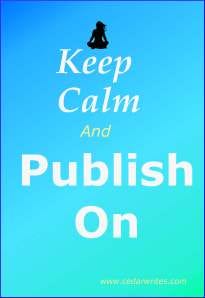Amazon and Pricing

Good Morning! Yes, I'm going there again. Frankly, I didn't want to, hadn't planned to, and really, why am I? Well, because I spent a significant chunk of time last night explaining to two different people the realities of Amazon, and rather than have to repeat myself in the coming days, I'm doing this now. Besides, it's art day, and I don't have art for you, I have been writing. Snippet is up Thursday, though, along with a cover reveal!
Here is how it works. Amazon is a seller of books (and pretty much anything else in the world you'd care to buy, but that isn't the point today). The publisher sets the price. I'll say that again, the publisher, whether traditional, indie, self, or whatever you want to call yourself, sets the list price. When it comes to paper books, this might be, say, 15.99, for a 350 page 6x9 trade paperback. I happen to know that book costs a little more than $5 to make. So let's say that if list is 15.99, and cost is 5.99, every copy you sell yeilds $10. Basic math, right? Well, Amazon takes a cut out of that, and if you the author are not also the publisher, the publisher takes a BIG cut out of that, and if you have an agent, they take a cut, and eventually, a trickle of income slides into the author's pocket from the sale of that book.
Got it? Well, here's the thing. You set that list price of $15.99, but Amazon being what they are, looking at prices, says 'we're going to discount that prices, so more people will buy your book.' Yay! More sales!
Amazon doesn't have to offer the discounts. They do it for their consumer, not to benefit authors or publishers. Amazon is a business, and a darn good one. They stay in business by making consumers of their products happy enough to come back, and keep coming back. So, they discount book prices.
Publishers, being the sneaky SOB's they are (I am one, after all), know how this works. They know that no one, simply no one except high-end boutique bookstores who don't give a darn, sells books at list price. Who's going to shell out almost $20 for a book they may read once, and if they're a fast reader like me, it will last about 2 hours? So publishers set their initial price knowing there will be a discount, and knowing if their initial price is high, they will still make a pretty profit.
This was actually the second thing I ran into last night, I'll address the first one below, it was a simpler problem, and this one was the more troubling. You see, I saw a post in my FB feed, a friend sharing a friend's concerns that his books had been removed from the discount program and had jumped in price $10 overnight. Almost immediately I saw a couple of problems, when I looked at the books. One, the ebooks were reasonably priced, and usually Indie authors make far more sales, and money, from their ebooks. Second, the prices of the books made no sense. One book, if it were discounted $10, would have been $4.28 new. I looked, it wasn't a pamphlet. If Amazon was really selling at that cost, they were losing money straight from production costs. The prices he was claiming were oddball, too, one at $19, and the other at $14.28, supposedly non-discounted. Most people don't price like that. Then I found out he wasn't the author, had no idea what the list prices were…
And I realized what we had here was an Amazon troll. He was deliberately trying to create a malicious rumor, to create a more unsettled feeling in Indie Authors toward Amazon. Look. If you're an Indie Author, the one thing you have going for you is control. If you don't want to sell on Amazon, don't sell on Amazon. But stop running around like chickens with your heads cut off just because Hachette, a huge corporation who treats their authors like dirt and expects them to like it, is fighting with Amazon.
The second issue I ran into is only obliquely related to Amazon. The author in question was panicking because she had checked her listing, and Amazon had raised her price $10, and so much for Amazon being a friend to the little guy and she was going to pull all her books and only sell them through her website…
Now, here's the thing. Amazon isn't the only seller who sells on Amazon. You know this, you've seen the listings for the used, refubished, collectible, and what-have-you items listed with the new ones supplied by Amazon. It's one of the things that makes Amazon so much fun to shop with. What you may not realize is that third-party sellers can create a separate line listing that doesn't lump with your book. Why do they do this? Well, in this person's case, the third party seller listed her $20 book at $30. Now, this is a legitimate sale. The 3rd party seller will buy her book, so she makes her money. What that seller is hoping to do is to trick a consumer into paying $10 more, and shoop… they make a tidy profit. It's a scam. There are a ton of them on Amazon (and everywhere else) so always be a savvy shopper. And if you're an Indie author, pay attention to the listing you're worried about. If it says third-party seller, or you see odd brackets around the title and author name, it is not an Amazon listing.
Um. My hands are tired. Basically, I'm saying to pay attention, do your homework, and above all, don't panic, keep publishing.



